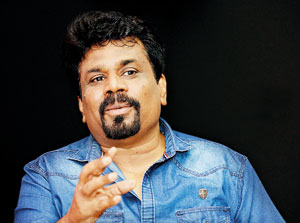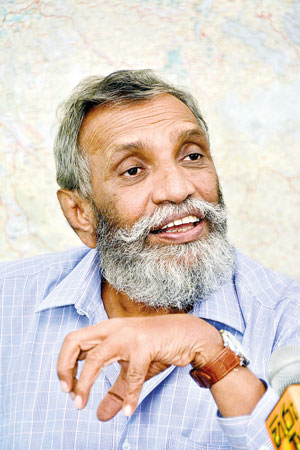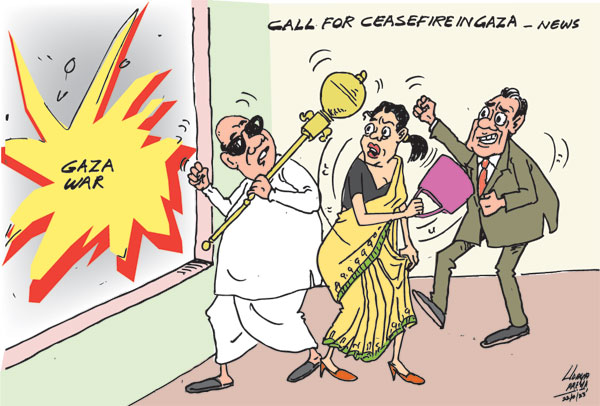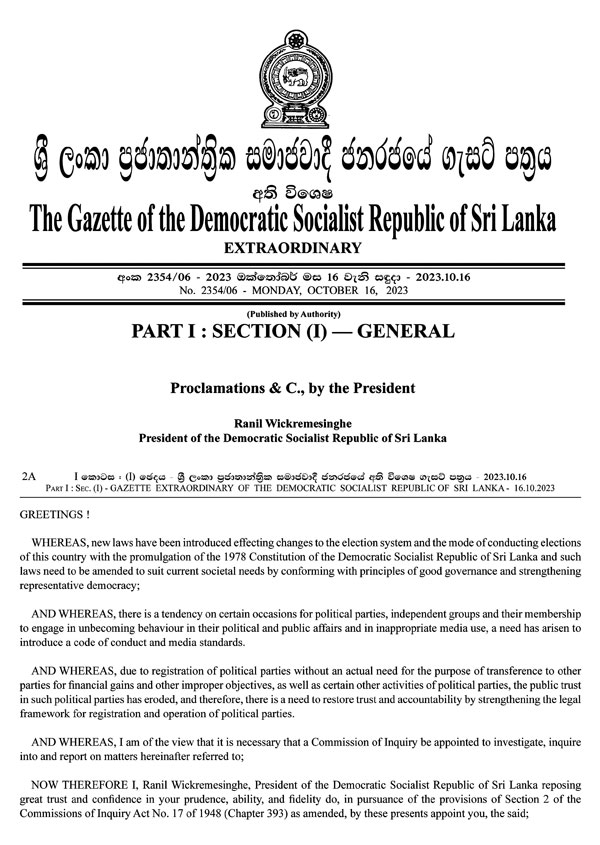Columns
- Other Government leaders surprised by move with questions over delay in elections
- Controversy over IGP’s third extension; JVP challenges President’s power to do so after CC’s rejection
By Our Political Editor
In a fast-changing political landscape, the prospects of any early election have receded after President Ranil Wickremesinghe named a nine-member Commission of Inquiry to effect drastic changes to electoral laws.
The changes pivot around not only mere structural adjustments. More importantly, they seek a complete overhaul of the country’s political culture. These are spelt out in a Gazette notification on October 17 by Saman Ekanayake, Secretary to the President. It is based on a promulgation issued by President Wickremesinghe, who has set a deadline of April 17 for their warrant to end.

NPP leader Anura Kumara Dissanayake: Challenges Presidential action in granting an extension to the IGP
This means elections are unlikely in that six-month period. Even further, there is a time frame before which the changes can be given legal effect. The Commission’s recommendations would have to go before the Cabinet of Ministers. Upon their approval, it would have to be presented to Parliament for its passage. There again, the contents are subject to challenge over their constitutionality before the Supreme Court ahead of the final passage of the recommendations.
“It would be very difficult for the Commission to complete its task in just six months. There must be hours and hours, days, and days of public discussion. This takes time. It could go on for even a year,” opined Mahinda Deshapriya, now President of the Association of Election Professionals of Ceylon (AEPC). The veteran public service official was the Commissioner of Elections and the first Chairman of the Election Commission after it was established. He added, “Reforms are most welcome. They are the need of the hour. Before that, we need the missing Provincial Council elections and the buried local council elections which were stymied by the Treasury by not making funds available.”
Surprise move
President Wickremesinghe’s move, in fast-changing political scenarios in Sri Lanka, took even sections of the ruling SLPP–UNP government by surprise. They had been focusing on reforms that had been discussed by the Cabinet when news of President Wickremesinghe’s latest move became public.
It is noteworthy that the Commission’s mandate specifically is “effecting changes to the election system and the mode of conducting elections.” No distinction has been made on a single or more election. It is, therefore, fair to assume that it will cover local, provincial, presidential, and parliamentary elections as well as referendums. Presidential elections should be held between September 16 and October 16 next year. Parliamentary elections are due in August 2025. However, in terms of the Constitution, the President (who has completed two and half years in office) is now empowered to dissolve Parliament anytime he deems fit.

Former Election Commissioner: Reforms are welcome but before that buried elections should be held
At the special convention of the United National Party at the Sugathadasa Indoor Stadium yesterday, President Wickremesinghe also referred to the scheduled dates in accordance with the Constitution.
President Wickremesinghe has identified a three-pronged rationale for the new laws. They are given in italics below:
“….effecting changes to the election system and the mode of conducting elections of this country with the promulgation of the 1978 Constitution of the Democratic Socialist Republic of Sri Lanka and such laws need to be amended to suit current societal needs by conforming with the principles of good governance and strengthening representative democracy.”
This preambular provision seeks to not only change the election system but also the mode of conducting elections. Whilst the parameters set out are broad, it must be borne in mind that the presidential form of governance and the presidential elections were the direct outcome of the 1978 Constitution.
As in other instances, there is also a contradictory situation. It was only last week that Justice and Constitutional Affairs Minister Wijeyadasa Rajapakshe told the Sunday Times that he proposed to introduce electoral reforms. Asserting that his proposed measures would not delay elections, he declared that it would see the election of 160 members to Parliament under the first-past-the-post system. The remaining 65 members in a 225-seat Parliament would be appointed from the National list and the District list depending on the number of voters under the proportional voting system.” This aspect has now come within the ambit of the Commission. The question that begs answers is whether Minister Rajapakshe will still go ahead with his proposals or await the findings of the Commission of Inquiry. He also told his parliamentary colleagues this week that he had presented a concept paper to the cabinet of ministers on the electoral reforms he had proposed.
On the other hand, Prime Minister Dinesh Gunawardena invited parliamentarians for a discussion at Committee Room 4 in Parliament on electoral reforms this week. It was, however, boycotted by some Samagi Jana Balawegaya (SJB) parliamentarians. Those who are constituent partners, however, took part in the event. Also boycotting was the Janattha Vimukthi Peramuna-led National People’s Power.
Udaya Gammanpila, leader of Pivithuru Hela Urumaya, declared that the electoral reforms were welcome. His remarks were short-lived. At the meeting he saw an SMS on his mobile phone that President Wickremesinghe had appointed a Commission of Inquiry to examine and report on electoral reforms. He asked Premier Gunawardena why there was a contradiction. The latter appeared surprised. He explained that he was acting in accordance with a decision by the cabinet of ministers to consult opposition parties and was unaware of the move. Dullas Allahapperuma, leader of the Freedom People’s Congress, noted that the Provincial Council elections had not been held and the local council elections had been put off. Parliamentarians Rishad Badiuddin and Mano Ganesan were also critical.
…..there is a tendency on certain occasions for political parties, independent groups and their membership to engage in unbecoming behaviour in their political and public affairs and in inappropriate media use, a need has arisen to introduce a code of conduct and media standards.”
This preambular paragraph does not define what “unbecoming behaviour” is or explain what is “inappropriate media use.” Of course, provision needs to be made in respect of “unbecoming behaviour” of parliamentarians. An example is the case of smuggler Puttalam District parliamentarian Ali Sabry Raheem. He was fined by Customs for smuggling gold and mobile phones through the VIP Lounge at the Bandaranaike International Airport. Despite a detailed report to Speaker Mahinda Yapa Abeywardena by the Customs, no action has been taken against him so far.
It is not clear whether the Commission will also focus attention on the issue of crossovers by MPs from one party to another. It is often a case of high jumping from the opposition to the governing party for ministerial positions and other considerations.
As for “inappropriate media use,” the Election Commission has a comprehensive list of dos and don’ts that are promulgated during an election period. Contradictions lay in the erosion of space left for the media to operate. Besides, the proposed Online Safety Bill, it is alleged, also imposes restrictions on the media. However, it is yet to be tabled in Parliament.
“…..due to registration of political parties without an actual need for the purpose of transference to other parties for financial gains and other improper objectives, as well as certain other activities of political parties, the public trust in such political parties has eroded, and therefore there is a need to restore trust and accountability by strengthening the legal framework for registration and operation of political parties.”
This third preambular paragraph is easily a welcome move. Politicians who quit, usually from a mainstream political party, and want to go their own way tend to fork out money or use persuasive means to purchase a registered political party.
The practice has been resorted to by those in all parties.
It is also not clear whether the Commission will also focus on political parties that have been formed on ethnic lines. This is again on the need to regulate them since some of their members are known to be openly switching sides or supporting issues in Parliament for alleged attractive consideration.

The nine-member Commission is headed by Justice Priyasath Dep, a retired Chief Justice and comprises S. Arumainayaham, A. Senanayake, Nalin J. Abeysekera, R.N.C. Senaratne Perera, A.L.M. Saleem, Sagarica Delgoda, Nimalka Fernando and Deepani Samantha Rodrigo. The Gazette notification appointing them, however, does not mention the name of the Secretary as is the usual practice.
The Commission has been called upon to “examine all existing election laws and regulations and make necessary recommendations” to amend election laws to suit current needs. It has been called upon to give “special consideration” to:
Increase women and youth representation.
Reduce the period between the time of the declaration of an election and the release of results after conducting such election.
Provide an opportunity for electronic voting by Sri Lankans (living) overseas.
Enable a person to contest two elections for the selection of people’s representatives and have the opportunity to represent both councils at the same time if elected (e.g. to give an opportunity for a person elected to Parliament to also contest a Provincial Council election, and if elected, have the opportunity to represent both councils at the same time).
Provide an opportunity for voters not serving in the government sector, and are engaged in provision of election-related services on election day, to use postal voting.
Formulate an appropriate mechanism blended with the first-past-the-post voting system for the election of people’s representatives, not limiting to the proportional representation system, but taking into consideration the plural nature of society, and reflecting such plural characteristics.
Make recommendations for the formulation of media standards for the appropriate use of media by political parties and independent groups.
Make recommendations for the introduction of a code of conduct for political parties, independent groups, and their membership in performing political and public affairs.
Make recommendations for the strengthening of laws and regulations related to registration of political parties and their operations in a manner that elicits trust and public accountability.

In another turn of events, the breakaway faction of the Sri Lanka Podujana Peramuna (SLPP), which styles itself as the Freedom People’s Congress held its parliamentary group meeting in Parliament. The subject of discussion was whether they would extend support to Sajith Premadasa and the SJB. G.L. Peiris, a former cabinet minister, was strongly in favour. He was of the view that it should be done without delay. He was supported by at least three others but the move was opposed by their leader Dullas Allahapperuma. Backing the latter was Charitha Herath. Allahapperuma was of the view that it was too soon and the group had to wait.
Dispute over IGP’s term extension
These developments came as opposition political parties raised issue in Parliament over a third extension of service granted to Police Chief, Chandana Wickremeratne. Anura Kumara Dissanayake, leader of the Janatha Vimukthi Peramuna (JVP)-led National People’s Power (NPP), spoke at length. He said:
“Mr Speaker, you are the Chairman of the Constitutional Council (CC). As per the Constitution, the CC must appoint the Inspector General of Police (IGP). But what has happened in recent days is that rather than appoint a new IGP, the term of the current IGP has been extended every three months in a manner akin to someone reloading their mobile phone account. The last extension given to the IGP ended on October 9. A few days ago, the CC received yet another recommendation from the President to grant a three-week term extension to the IGP. However, the CC has not approved this recommendation. He was given a three-week term extension by the President subject to approval by the CC, but the CC has now refused to approve this extension.
“As such, I would like to ask you as to who the IGP of this country is. If the approval had been sought before his term of office expired, then we would have been able to approve a new IGP since there would still have been time to do so. But the approval for this term extension was sought after October 9, after his last term extension had expired. The CC has now declined to approve his term extension. Therefore, who is our IGP now?
“The minister in charge of police is also present in this House. I would like to ask him as to who is the IGP he issues instructions to because the term of the ‘Reload IGP’ has expired. The minister has to issue instructions to police through the IGP, but the term of the incumbent IGP has ended. As such, we ask again, who is the current IGP of Sri Lanka?”
Prime Minister Dinesh Gunawardena: “Regarding the IGP, the President has used the powers vested with him to give a service extension to the incumbent IGP till the end of this month. You (Speaker) and I can only answer this question while acting under the agreement not to divulge internal discussions that took place within the CC.”
Anura Kumara Dissanayaka: “I am not asking anyone to divulge internal discussions within the CC. But the country must know the decision that was arrived at following those discussions. The current IGP was granted two service extensions, each lasting three months. On both occasions, the President submitted his recommendation to the CC to give him those term extensions, which the Council approved. That shows that the CC must approve the President’s recommendations for them to be enacted.
“His last term extension came to an end on October 9. With the CC refusing to approve the recommendation to give him a further three-week term extension, the IGP has no power to act in that capacity after October 9. That is why we want to know who the IGP is now.”
Speaker Mahinda Yapa Abeywardena: “It is true that the CC must approve the recommendation. But it is the President who has the power to appoint. Neither the Constitution nor the CC has taken that power away from him. The CC has the power to either approve or reject. But beyond that, the President still has the power to either make the appointment or not.”
Anura Kumara Dissanayaka: “Given your statement just now, I am now speaking not just about the IGP. The procedure is that the President sends the CC a recommendation and once the CC approves it, he makes the appointment. If the CC rejects that recommendation, the President has no power to make the appointment. Your statement that the President can still make an appointment irrespective of whether it is approved or rejected by the CC would render the body meaningless.
“The procedure is crystal clear. If the CC rejects a nomination, the President must submit another name. You are the Chairman of the CC. I urge you not to let the President take over the powers of the body that comes under you. You need to be firm on this. You must hold that the President cannot make such an appointment without the CC’s approval.”
The age of retirement for state officers is 60. Police Chief Wickremeratne reached the age of 60 on March 26 this year and retired from the service. He received two extensions of three months each. The third, an extension for three weeks, was given by President Wickremesinghe in keeping with the powers vested in him, a government source said. The earlier extensions, he said, were approved by the Constitutional Council.
The major changes expected in the electoral system and matters relating to it will no doubt impact dramatically on the country’s political firmament. At the same time, it has effectively delayed the conduct of any election. President Wickremesinghe has inherited an unenviable task in the appointment of a new Police Chief. Some of those pushing for this high office have disqualified themselves by their own conduct but are working overtime pleasing top politicians to win the coveted post. Their colleagues lament that they do not have the strong political clout to demonstrate their suitability. This goes on whilst there is a deterioration of the law-and-order situation and a steep rise in killings.
| Easter bombing: Resolution to appoint Parliamentary Select Committee A resolution to appoint a Parliamentary Select Committee (PSC) to probe the disclosures made by Britain’s Channel 4 was approved by Parliament last Tuesday. Such a body has been given wide powers whilst another probe is now underway by a three-member Committee that is of a fact-finding nature. When President Ranil Wickremesinghe announced the appointment of the Committee last month, he declared that a PSC was being appointed to investigate another aspect of the 2019 Easter Sunday massacres. That related to the claim made by onetime Attorney General Dappula de Livera that there was a ‘grand conspiracy’ behind the killings. In addition, the PSC is also being tasked to investigate the Channel 4 disclosures. In its regular programme Dispatches, aired last month, the television channel claimed that Sri Lanka’s national intelligence chief was complicit in the Easter Sunday massacres. Hanzeer Azad Mowlana, who was introduced as a ‘whistleblower’ claimed in an interview that the head of national intelligence and Islamic state-affiliated bombers hatched a plot to “destabilise Sri Lanka and facilitate the return to power of the Rajapaksas.” The State Intelligence Service (SIS) head flatly rejected the claims. The prime mover was Parliamentarian Major Pradeep Undugoda, a retired Army officer. Other signatories are: Wajira Abeywardana, Gunathilaka Rajapaksha, Sanjeeva Edirimanna, D. Weerasingha, U. K. Sumith Udukumbura, Jayantha Ketagoda, Jagath Samarawickrama, Karunadasa Kodithuwakku, Madhura Withanage, Samanpriya Herath Jagath Kumara Sumithraarachchi, D. B. Herath, (Mrs.) Kokila Gunawardene, Upul Mahendra Rajapaksha, Udayakantha Gunathilaka, H. Nandasena, Nalaka Bandara Kottegoda, Kumarasiri Rathnayaka and C. B. Rathnayake, This is what the resolution said: “Select Committee of Parliament to investigate into the allegations levelled by the programme telecast by the “Channel 4” of Britain on the Easter Sunday suicide bomb attack.” “Whereas the Easter Sunday suicide bomb attack of 21st April 2019 which claimed the lives of 269 people and wounded over 500 people caused a colossal impact on the economy of this country and probed at various levels including a Presidential Commission of Inquiry to inquire into the said attack; “Whereas the programme telecast by the “Channel 4” Television channel of Britain on the 05th of September 2023 titled “Sri Lanka’s Easter Bombings– Dispatches” has alleged that senior Intelligence Officers of the Army and some politicians have had connections with the terrorists who unleashed the said suicide attack which took place on 21.04.2019; “Whereas the then Attorney General, Dappula De Livera, P.C. has stated at a discussion with “News First” on the 17th May 2021, when his retirement was around the corner that a huge conspiracy was behind this attack and even though Naufer Moulavi was one of the main figures and the group leader of this conspiracy, it cannot be exactly opined that he was the mastermind of the attack and that though Zaharan Hashim decided to carry out the attack he is only one individual involved in the conspiracy, despite the fact that he had direct access to all investigation materials, investigation reports, evidence and other such information; “Accordingly, there arise reasonable doubts that the then Attorney General, Dappula De Livera, P.C., has got some information that has not been revealed so far regarding the Easter Sunday attack, and whereas his statements and the facts based on which such statements were made have to be properly disclosed; and, “Whereas Hon. Shanakiyan Rajaputhiran Rasamanickam, MP, addressing the Parliament on 08.09.2023 after the release of the “Channel 4” video, levelled an allegation against judges and officials of various capacities regarding this incident by presenting a video recording, and the YouTuber named Ajith Dharmapala, too, has spread various controversial facts among the society stating the names of various persons; “This Parliament resolves that a Select Committee of Parliament be appointed to inquire into whether there are facts which reveal that the officials and politicians, against whom accusations are levelled by the aforesaid “Channel 4” programme and by other parties, have had relationships or had conspired with the terrorists who launched the suicide attacks or regarding any action or inaction, and to study the investigations that have been carried out so far by the Sri Lanka Police, and to report to Parliament. “2. (a) that the Chair and Members of the Committee shall be appointed by the Speaker; and “ (b) that in terms of the provisions of Standing Order 101 of Parliament, the Committee shall consist of Eleven (11) Members. “3. That the Committee shall have the power to— “(a) fix its quorum. “(b) summon any person to appear before it, to require any person to procure any document or record, to procure and receive all such evidence, written or oral, as the Committee may think it necessary for the fullest consideration of the matters referred to above; “(c) obtain the services of specialists and experts in the relevant fields to assist the Committee; and “(d) make interim reports from time to time and to sit notwithstanding any adjournment or prorogation of Parliament. “4. The Committee shall present its report to Parliament within a period of two months, “(02) from the first meeting of the Committee or within such further period as Parliament may grant.” The three-member committee appointed by President Wickremesinghe to probe the Channel 4 disclosures is headed by retired Supreme Court Judge Syed Ishrat Imam and comprises Air Chief Marshal Jayalath Weerakkody, a former Commander of the Sri Lanka Air Force (SLAF) and Harsha Soza, President’s Counsel. The three-member committee, which is fact-finding, was originally expected to conduct its sittings from the Jayewardene Centre at Anagarika Dharmapala Mawatha. However, since the venue was pre-booked, it found an office at the Standard Chartered building in Fort. The Committee, the Sunday Times learned, has invited representatives of Channel 4 to testify before them. They have also sought an affidavit from Hanzeer Azad Mowlana about the statements attributed to him by Channel 4.
| |
Buying or selling electronics has never been easier with the help of Hitad.lk! We, at Hitad.lk, hear your needs and endeavour to provide you with the perfect listings of electronics; because we have listings for nearly anything! Search for your favourite electronic items for sale on Hitad.lk today!


President appoints special commission to drastically change election laws
View(s):